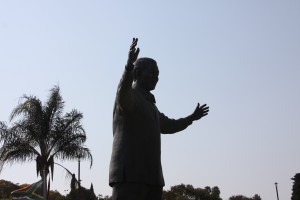 This is the first time in eight years that I will not be leading worship services on Christmas Eve or ending my Christmas homily just as the minute and hour hands converge on midnight. Our decision to move to Ohio so that Nanette can pursue her calling as Senior Minister of a large urban congregation meant that I took my leave from the wonderful folks of First Church in Farmington at the end of September. Our parting was sooner than we had imagined and tinged with sadness. Yet this move was a continuation of my preaching on love, mutuality, and equality as I now follow and support my wife and her ministry while preparing myself for new possibilities. I believe it was Saint Francis who said, “Preach the gospel at all times and when necessary use words.â€
This is the first time in eight years that I will not be leading worship services on Christmas Eve or ending my Christmas homily just as the minute and hour hands converge on midnight. Our decision to move to Ohio so that Nanette can pursue her calling as Senior Minister of a large urban congregation meant that I took my leave from the wonderful folks of First Church in Farmington at the end of September. Our parting was sooner than we had imagined and tinged with sadness. Yet this move was a continuation of my preaching on love, mutuality, and equality as I now follow and support my wife and her ministry while preparing myself for new possibilities. I believe it was Saint Francis who said, “Preach the gospel at all times and when necessary use words.â€
Words. I’ve been thinking about the words I would have preached this Christmas Eve were I back in the elevated pulpit of First Church. As I think over the texts that give rise to pretty Christmas card scenes, what stands out to me this year is the potential of a single person to challenge and overcome the metaphysics of violence.
The metaphysics of violence speaks to the apparent ontological claim of violence to absolute authority and being. It gives rise to a theodicy that confines horizons of imagination and agency to an action-reaction framework where the end goal is always victory over an enemy. An enemy is the person who threatens to take away what I have or who I am. Engaging the enemy, real or imagined, binds the hope and destiny of nations to materialist gain rather than the lofty ideals of peace through mutuality, equality, and liberty.
It’s a snare into which political leaders and news agencies perpetually lead all-too-willing populations. It appeals to the lowest common denominator in consumerist societies where rationality and agency are sacrificed on the altar of democratic process to ratify the hegemonic power of the state, thereby ordaining the state to do whatever it takes to protect the interests of citizens and businesses from the terrors that lurk in the darkness of chaos and otherness.
Terror, chaos, and suspicion of the other are the currency of the metaphysics of violence. Terrorism is its most sinister embodiment. Those who employ terrorist methodologies aim to inflict not just sporadic physical harm to victims of attacks, but more comprehensively to spark terror so stark and so pervasive that the imaginative horizons of people and societies are curtailed by existential minutia. In the spiritual quagmire that results anyone and anything that is opposed to or different from me and mine is a threat that needs to be dealt with immediately, decisively, violently.
How easy it is to exploit people in this atmosphere of fear. Shoot to kill. Build a wall. Turn away Muslims. Make the sands of the Middle East glow. Go to war. Shock and awe. Terrorize.
Into the dark night of this terror glows a feint star heralding an alternative spirituality grounded in the metaphysics of self-giving love. From a religious perspective, the Christian narrative of the birth of Jesus and his subsequent life, ministry, death and resurrection offers an antidote to the metaphysics of violence. True to its nature violence threatens always in the shadows of this story. Violence underscores its climax and lies in tatters in its denouement.
At the center of this story is the single personage of Jesus, who stands opposed to empire and oppression, fear and loathing of the other, and violence in all of its many forms.
Jesus taught that peacemakers would be blessed, enemies should be loved, persecutors prayed for, disputes amicably settled, and that vengeance should be left to God alone. In keeping with his Jewish tradition of praying the Shema he advocated absolute love for God and love for neighbor. He gave a new commandment that his disciples love one another as he had loved them – on his knees washing their feet and sacrificing his very life as a scapegoat for the political and theological sins of a world exhausted by the metaphysics of violence.
The term “sacrifice†should be understood with its Latin roots in mind: sacer (meaning sacred or holy) and facio (meaning to do or to make). By sacrificing his life, the babe of Bethlehem grown to be a man sanctified not just himself but a world opened to the possibility of definitive stands against the metaphysics of violence.
 Standing against spiritualities that are predicated on violence does not depend on status or vocation. One need not feel like an imposter or eminence grise. It merely takes courage to wage peace by exhibiting self-sacrificing love. The illustrious work of Ghandi, Martin Luther King, Jr., and Malala Yousefzai started with a decision to take a stand against fear, terror, and violence. One could argue that the actions of Chelsea Manning and Edward Snowden are in this vain, though Snowden’s case would be more compelling were he to return to the United States and justify his actions in a court of law, presuming a fair trial is possible.
Standing against spiritualities that are predicated on violence does not depend on status or vocation. One need not feel like an imposter or eminence grise. It merely takes courage to wage peace by exhibiting self-sacrificing love. The illustrious work of Ghandi, Martin Luther King, Jr., and Malala Yousefzai started with a decision to take a stand against fear, terror, and violence. One could argue that the actions of Chelsea Manning and Edward Snowden are in this vain, though Snowden’s case would be more compelling were he to return to the United States and justify his actions in a court of law, presuming a fair trial is possible.
The high profile of theese examples notwithstanding, opposing the metaphysics of violence starts simply with a decision to take a stand.
As I ponder the words I might have preached this Christmas were I back in the warm Meetinghouse in Farmington, I think I would point to the story of the babe born in a stable in Bethlehem and encourage my hearers to give serious consideration to the change he heralded. I would ask them to imagine the change they might usher into the world by taking a stand, just as he did, against the metaphysics of violence, a stand based in the metaphysics of God’s self-sacrificing love for all the world.